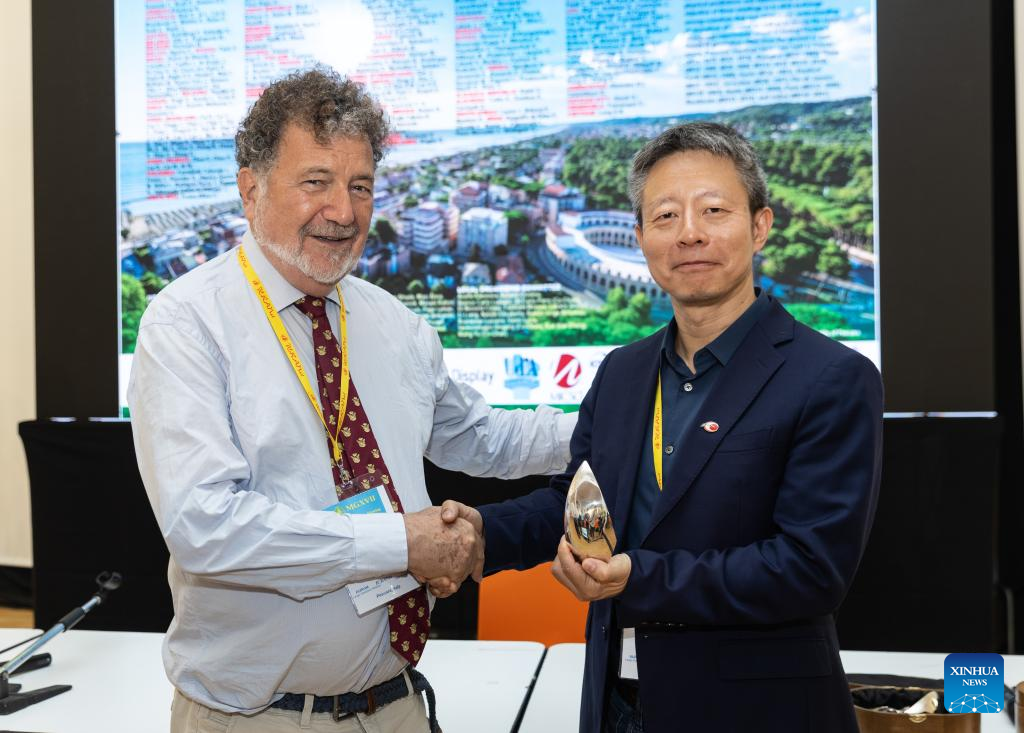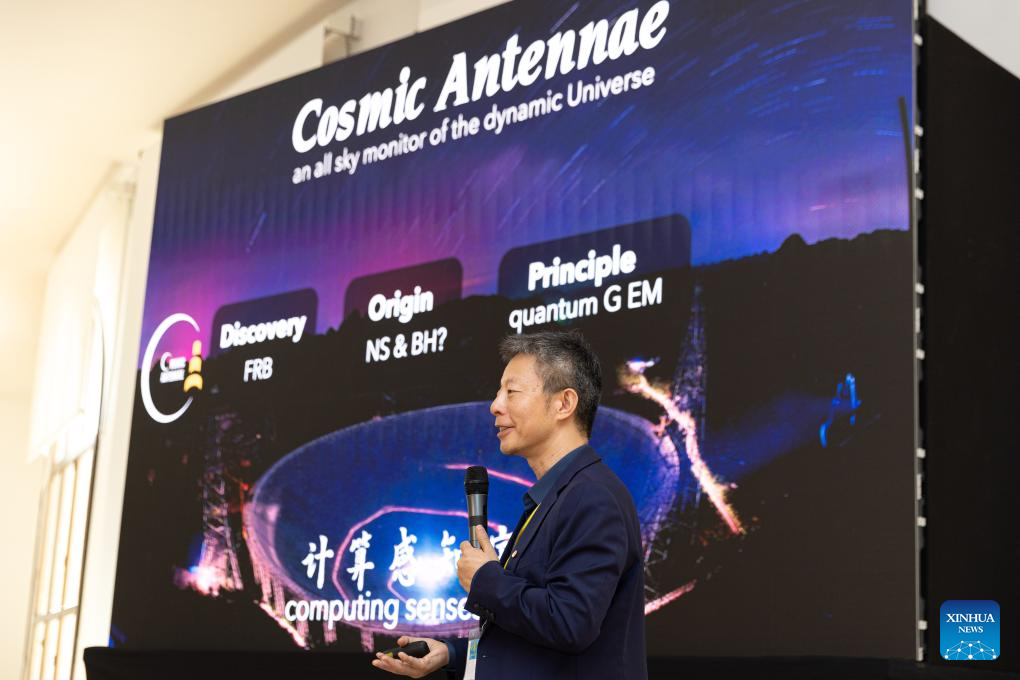

Li Di (R), a Chinese radio astronomer and chief scientist of China's five-hundred-meter Aperture Spherical Radio Telescope (FAST), is presented the Marcel Grossmann Award by Remo Ruffini, director of the International Center for Relativistic Astrophysics Network (ICRANet), in Pescara, Italy, on July 9, 2024. The five-hundred-meter Aperture Spherical Radio Telescope (FAST) located in southwest China's Guizhou Province has yielded significant scientific results and created a new avenue for astronomical collaboration between China and European countries in recent years. (Xinhua/Li Jing)
The Five-hundred-meter Aperture Spherical radio Telescope (FAST) located in southwest China's Guizhou Province has yielded significant scientific results and created a new avenue for astronomical collaboration between China and European countries in recent years.
Li Di, a Chinese radio astronomer and chief scientist of FAST, received the Marcel Grossmann Award on Tuesday from the International Center for Relativistic Astrophysics Network (ICRANet), becoming the first Chinese scientist to be awarded this prestigious international award in physics.
Li, a researcher from the National Astronomical Observatories of the Chinese Academy of Sciences (CAS), was awarded the prize for his groundbreaking contributions to the scientific capabilities of the world's most sensitive radio telescope, including precise measurements of interstellar magnetic fields and advancing the study of fast radio bursts (FRBs) to a high statistical significance, according to the committee of the 17th Marcel Grossmann Meeting underway in Pescara, Italy.
Remo Ruffini, director of ICRANet, said that he has been collaborating with China and admiring the fantastic work Li has been able to create with FAST. He hopes to enhance collaboration in the future.
The FRBs are the brightest millisecond-duration astronomical transients in radio bands with yet unknown origins. Less than 5 percent of those ever detected have been seen to repeat, and only a few are persistently active.
Li said that the study of FRBs holds the opportunity for significant breakthroughs in understanding the mechanisms of extreme energy production and transport in the universe.
Currently, FAST has detected the greatest number of bursting events, making epoch-making contributions to the FRB field, he added.
Located in a naturally deep and round karst depression in Guizhou, FAST was completed in 2016 and started formal operations in 2020.
Since its opening, FAST has attracted researchers from many European countries, including Italy. With its high sensitivity, FAST provides astronomers with a powerful tool for studying various cosmic objects, including pulsars in globular clusters, and some of the most ancient celestial bodies in the Milky Way.
Renowned experts Paulo Freire from the Max Planck Institute in Germany, and Alessandro Ridolfi from the Cagliari Astronomical Observatory of the Italian National Institute for Astrophysics, have both collaborated with Chinese scientists in exploring globular cluster pulsars using the FAST telescope and have discovered new pulsars with special properties.
Ridolfi led the development and optimization of various pulsar data processing software, including pulsar observation data compression, search, and timing observations, contributing to a series of discoveries in globular clusters.
In 2022, Ridolfi received funding from the CAS President's International Fellowship Initiative. He assisted astronomers from China's National Astronomical Observatories in using the FAST telescope to explore globular cluster pulsars, leading to the discovery of pulsars with special properties.
"These new discoveries not only enrich our understanding of globular clusters but also provide valuable samples for future research and promote international exchange and cooperation through FAST," said Li, expecting more exciting discoveries with FAST in the future through international cooperation.
China, as a founding member of the intergovernmental international radio telescope project Square Kilometer Array (SKA), has been carrying out joint research with European countries.
Philippe Zarka, an astrophysicist at the Paris Observatory, joined colleagues from China's Peking University and Sun Yat-sen University in studying radio bursts produced by the active star AD Leonis, detected with FAST in the range 1-1.5 GHz, and took charge of the interpretation of these observations.
"With FAST, we have observed radio bursts from the star AD Leonis, not for the first time, but with the highest sensitivity and time-frequency resolutions," said Zarka. He added that the exquisite sensitivity and high time-frequency resolutions of FAST were instrumental in his research.
Zarka said that FAST may bring very interesting results on star-planet interactions, and he has high expectations for comparing FAST results at ~1 GHz with NenuFAR results below 100 MHz.
FAST was officially opened to the world in 2021. Sun Chun, the engineer in charge of FAST measurement and control, said that as of April 2024, FAST has received applications from 15 foreign countries, including Britain, France, and Italy, and approved a total of nearly 900 hours for observation.
"The collaboration with Chinese scientists was very nice and fruitful, and two proposals between Chinese and French scientists were submitted in response to the latest call from FAST for next year," said Zarka.
There is significant expertise in developing low-frequency radio arrays in Europe, and Zarka expressed hope that cooperation with China on these subjects will continue to develop. (Xinhua)

Li Di (R), a Chinese radio astronomer and chief scientist of China's five-hundred-meter Aperture Spherical Radio Telescope (FAST), is presented the Marcel Grossmann Award by Remo Ruffini, director of the International Center for Relativistic Astrophysics Network (ICRANet), in Pescara, Italy, on July 9, 2024. The five-hundred-meter Aperture Spherical Radio Telescope (FAST) located in southwest China's Guizhou Province has yielded significant scientific results and created a new avenue for astronomical collaboration between China and European countries in recent years. (Xinhua/Li Jing)

Li Di, a Chinese radio astronomer and chief scientist of China's five-hundred-meter Aperture Spherical Radio Telescope (FAST), makes a speech at the 17th Marcel Grossmann Meeting in Pescara, Italy, on July 9, 2024. The five-hundred-meter Aperture Spherical Radio Telescope (FAST) located in southwest China's Guizhou Province has yielded significant scientific results and created a new avenue for astronomical collaboration between China and European countries in recent years. (Xinhua/Li Jing)

Li Di (Front), a Chinese radio astronomer and chief scientist of China's five-hundred-meter Aperture Spherical Radio Telescope (FAST), makes a speech at the 17th Marcel Grossmann Meeting in Pescara, Italy, on July 9, 2024. The five-hundred-meter Aperture Spherical Radio Telescope (FAST) located in southwest China's Guizhou Province has yielded significant scientific results and created a new avenue for astronomical collaboration between China and European countries in recent years. (Xinhua/Li Jing)

Li Di (Rear), a Chinese radio astronomer and chief scientist of China's five-hundred-meter Aperture Spherical Radio Telescope (FAST), makes a speech at the 17th Marcel Grossmann Meeting in Pescara, Italy, on July 9, 2024. The five-hundred-meter Aperture Spherical Radio Telescope (FAST) located in southwest China's Guizhou Province has yielded significant scientific results and created a new avenue for astronomical collaboration between China and European countries in recent years. (Xinhua/Li Jing)

86-10-68597521 (day)
86-10-68597289 (night)

52 Sanlihe Rd., Xicheng District,
Beijing, China (100864)

